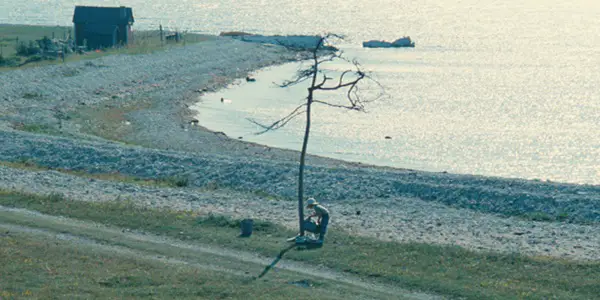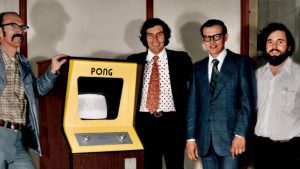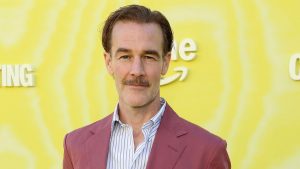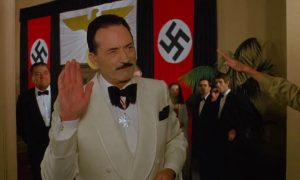
Would you give up everything that makes the world worth living in to save it from almost certain destruction? Such is the conundrum at the center of The Sacrifice, the final film directed by Andrei Tarkovsky before his death from cancer at the age of only 54. Shot in exile from his native Soviet Union on the Swedish island of Gotland, Tarkovsky teamed up with many of Ingmar Bergman’s longtime collaborators—including actor Erland Josephson and cinematographer Sven Nykvist—to tell the hauntingly beautiful tale of an aging intellectual who embraces both Christianity and paganism in an attempt to stave off the apocalypse. Now available in a new 4K restoration from the Swedish Film Institute, The Sacrifice is a fitting epitaph to the life and career of one of cinema’s most surreal storytellers.
The End of the World
Actor-turned-aestheticist Alexander (Josephson) is fond of monologuing at his young son—known affectionately as Little Man and temporarily mute from a throat operation—about his displeasure and disappointment in the direction the modern world is heading. More than anyone else in his close circle of family and friends—including wife Adelaide (Susan Fleetwood), stepdaughter Marta (Filippa Franzén), postman-slash-paranormal investigator Otto (Allan Edwall), and surgeon Victor (Sven Walter)—Alexander feels that Little Man is his kindred spirit…though that could be because the boy is the only one incapable of arguing with Alexander’s angry pronouncements.
source: Kino Lorber
As the group gathers at Alexander and Adelaide’s lovely seaside home to commemorate Alexander’s birthday, the threatening roar of airplanes suddenly interrupts the celebrations. The sky darkens, the color is washed out of the world, and the news reports that nuclear holocaust is imminent. Everyone in the group reacts to the horror of the situation in different ways; melodramatic Adelaide has a nervous breakdown and must be sedated, loyal maid Julia (Valérie Mairesse) devotes herself to Little Man to the point of obsession, and desperate Alexander attempts to make a deal with God, claiming that he’ll renounce everything he holds dear—including his beautiful home and his beloved Little Man—if this apocalypse can be averted. Otto, however, has another suggestion: go to the home of eccentric Icelandic maid Maria (Guðrún Gísladóttir) and sleep with her, he says, claiming that Maria is a witch with the power to save them all.
The Power and the Glory
The Swedish setting, spiritual content, and presence of certain Bergman collaborators mean that you cannot help but view The Sacrifice as a companion piece to films like Through a Glass Darkly, Shame, and The Virgin Spring, films that wrestle with religious concepts and question how any god—Christian or pagan—could allow such violence and horror to be wreaked upon the world. All three of those films were shot by Sven Nykvist, and while it’s hard to think of a filmmaker better suited to Nykvist’s style than Bergman, The Sacrifice makes as good an argument as any for Tarkovsky; their collaboration results in some of the most powerful images ever committed to celluloid.
source: Kino Lorber
As hope begins to drain from the people gathered in Alexander’s house, all of the color and beauty begins to drain from the world, leaving everyone stranded in a dark and disturbingly washed-out landscape that makes you feel as though you are truly witnessing the end of the world. (If I live to see the apocalypse, I only hope it looks as striking as this, all shot through with silvery greys.) Certain images linger in the mind long after the film is over, like loose strands of a nightmare that you grasp through the fog of waking: people in a devastated urban area pushing each other over to try and escape the inescapable, Marta stripping off her clothes and floating through the house like a vulnerable ghost mourning the adulthood she may never get to experience, Alexander and Maria making love to the soundtrack of rumbling jets while floating above her bed (one of several scenes that must have been a great influence on Paul Schrader’s own parable of faith and destruction, First Reformed).
As Alexander, Josephson delivers one of the most deeply felt performances of his illustrious career; his single-minded devotion to saving the world for Little Man and the others even if it leaves him with nothing worth living for almost overwhelms the viewer with its intensity. The film’s final sequence, an uninterrupted six-minute take in which the camera observes Alexander’s fiery final attempt to deliver upon the promises he’s made to the powers that be, is one of the most emotionally impactful in cinematic history; that it is followed by an epitaph in which Tarkovsky dedicates the film to his son “with hope and confidence” only makes the heart ache more.
Conclusion:
Tarkovsky’s work redefined how the language of cinema can be used to tell stories. He only made seven feature films during his lifetime, yet even if he had only made The Sacrifice, he’d have earned his place among the greats.
The new 4K restoration of The Sacrifice opens at Film Forum in New York on October 25, 2024.
Does content like this matter to you?
Become a Member and support film journalism. Unlock access to all of Film Inquiry`s great articles. Join a community of like-minded readers who are passionate about cinema – get access to our private members Network, give back to independent filmmakers, and more.











